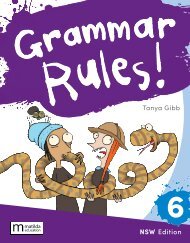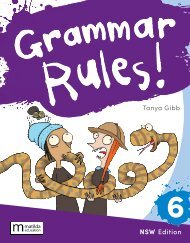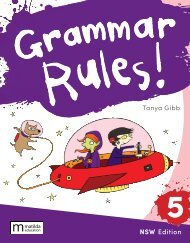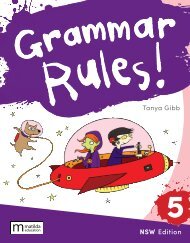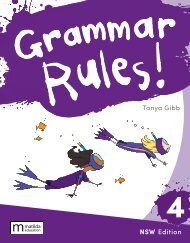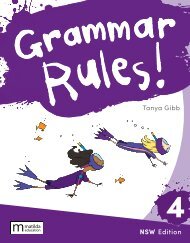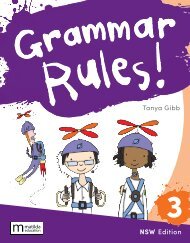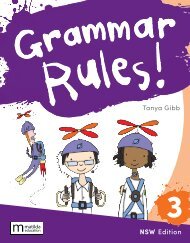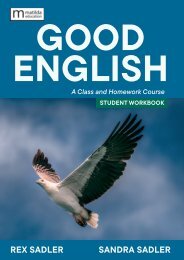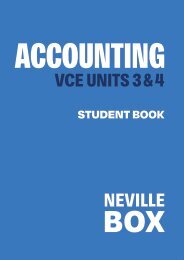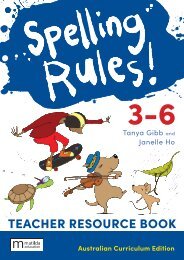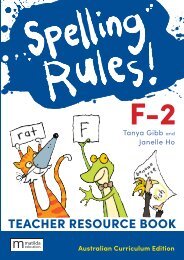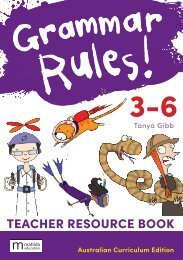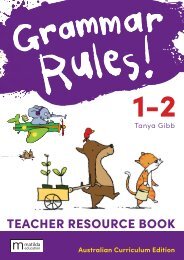Good Science Victorian Curriculum Year 7
Digital sample of Matilda's newest publication, Good Science Victorian Curriculum Year, authored by Emma Craven and Aaron Elias. For more information visit www.matildaeducation.com.au or email Katrina Tucker, katrinatucker@matildaed.com.au
Digital sample of Matilda's newest publication, Good Science Victorian Curriculum Year, authored by Emma Craven and Aaron Elias. For more information visit www.matildaeducation.com.au or email Katrina Tucker, katrinatucker@matildaed.com.au
Create successful ePaper yourself
Turn your PDF publications into a flip-book with our unique Google optimized e-Paper software.
fractional distillation a method<br />
that separates liquids by using their<br />
different boiling points<br />
friction a force opposite to the<br />
motion of surfaces in contact<br />
froth flotation a method that uses<br />
special chemicals to separate<br />
minerals from their ores<br />
fulcrum the point on which a lever<br />
turns when moving an object<br />
galaxy a large system of stars<br />
gravitational force the force that<br />
attracts physical objects with mass<br />
towards each other<br />
gymnosperm a plant that produces<br />
seeds in cones<br />
habitat the place where an animal<br />
or plant naturally lives<br />
hazard something that can<br />
harm living things, objects or<br />
the environment<br />
heat a type of energy<br />
heating flame the blue (very hot)<br />
flame of a Bunsen burner (approx.<br />
1500ºC), used for heating substances<br />
herbivore an organism that eats<br />
only plants<br />
hydropower electricity generated<br />
by flowing water turning a turbine<br />
hypothesis a scientific statement<br />
that can be tested<br />
immiscible not able to be mixed<br />
impact the effect of a force<br />
inclined tilted up at an angle from<br />
horizontal<br />
independent variable the thing<br />
that is purposely changed during<br />
an investigation<br />
inference an educated guess or<br />
judgement based on observations<br />
insoluble something that does<br />
not dissolve<br />
interact to act on each other<br />
invertebrate an organism without<br />
a backbone or spinal cord<br />
irrigation supplying water to land<br />
or crops<br />
key a system for identifying<br />
characteristics<br />
lever a bar acted upon at different<br />
points by two forces<br />
lubrication a substance that makes<br />
a surface slippery or smooth<br />
made resource a resource that<br />
is manufactured from natural<br />
resources<br />
magnitude the size or power of<br />
an object, energy or force<br />
mass the amount of matter in<br />
an object<br />
matter the particles that make up<br />
all physical substances; anything<br />
that has mass and takes up space<br />
melting point the temperature at<br />
which something changes from a<br />
solid to a liquid<br />
microorganism an organism that<br />
is only visible under a microscope<br />
mineral deposit rocks that contain<br />
a particular mineral<br />
mineral ore a mineral that contains<br />
useful metals<br />
mixture a substance that is<br />
composed of different types of<br />
particles, all mixed together<br />
model a simplified way of explaining<br />
something complex and real based<br />
on evidence<br />
monoculture the practice of<br />
cultivating a single crop in a<br />
given area<br />
motion the change in position of<br />
an object over time<br />
natural resource a resource that<br />
is valuable in its natural form<br />
naturalist someone who studies<br />
nature and its history<br />
net force the sum of all forces<br />
acting on an object<br />
non-biodegradable does not break<br />
down in the environment<br />
non-renewable resource<br />
a resource that can run out, or one<br />
that takes longer than a human life<br />
span to be restored<br />
observation something you see<br />
and know to be true<br />
oil slick a layer of oil on the surface<br />
of water<br />
omnivore an organism that eats<br />
both animals and plants<br />
orbit the curved path a smaller<br />
object takes around another object<br />
ore a rock found in nature that<br />
contains metal<br />
ore body a mineral deposit that<br />
is profitable to mine<br />
organism an individual animal,<br />
plant or other living thing<br />
paper chromatography<br />
a technique used to separate<br />
coloured substances using a strip<br />
of paper and a solvent<br />
parasite an organism that lives in<br />
or on another organism, causing<br />
it harm<br />
particle a very small amount<br />
of matter<br />
particle model a model used to<br />
describe the properties of solids,<br />
liquids and gases<br />
pathogen a microorganism that<br />
can cause disease<br />
penumbra the outer part of the<br />
Moon’s shadow on Earth<br />
pesticides chemicals used on<br />
farms to protect crops by killing<br />
pests<br />
plankton microscopic, animal-like<br />
organisms that float or drift in water<br />
population all the living things of<br />
one species in a particular area<br />
predator a consumer that kills and<br />
feeds on another animal<br />
prediction a statement about<br />
the future based on observation<br />
and evidence<br />
GLOSSARY<br />
185




